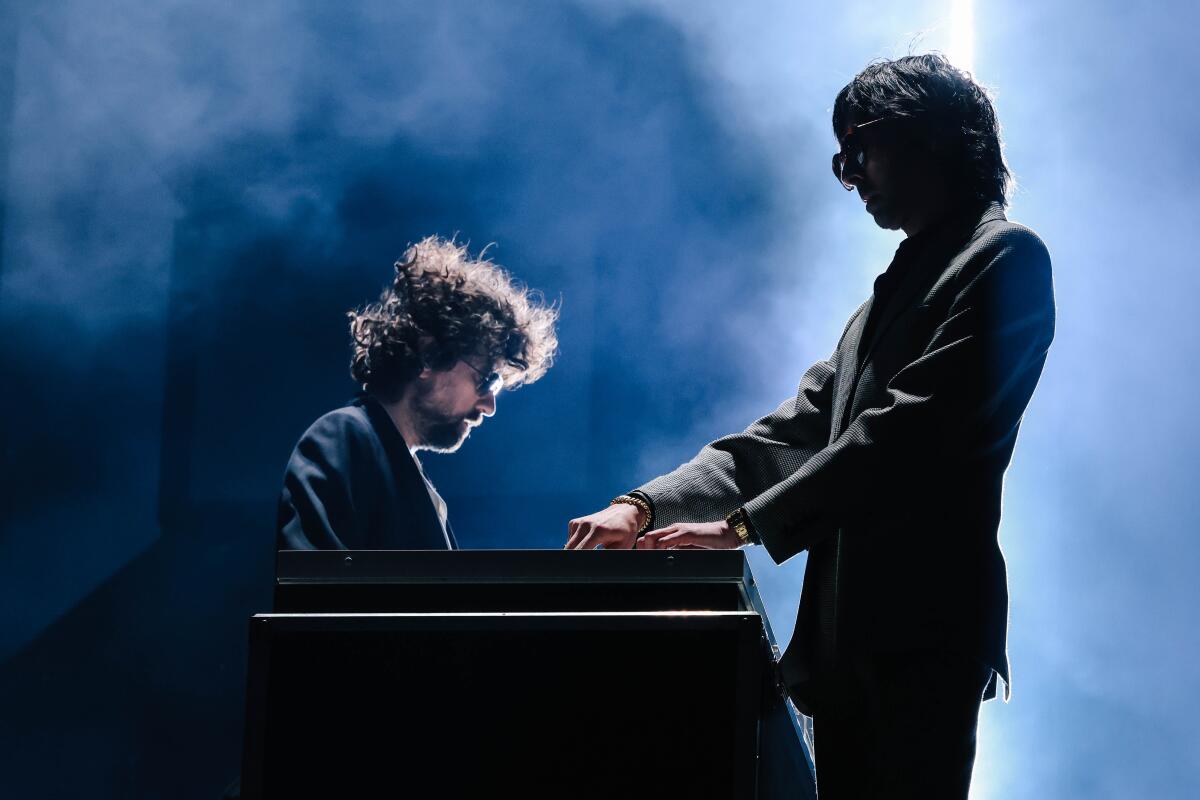Dance duo Justice just crushed Coachella. Eight years between albums, ‘We don’t like to be too exposed.’

- Share via
At peak time on the opening night of the first weekend of Coachella, atop the Outdoor Theater stage, Gaspard Augé and Xavier de Rosnay’s silhouettes were unmistakable. The two members of the French electronic duo Justice hovered over a table of inscrutable-looking mixers and audio gear, the lanky Augé’s curly hair and De Rosnay’s angular suit cutting through the fog and panels of LED lights that bent and refracted around them.
The return of the duo — one of the most influential acts in club music since its early-aughts debut — was one of the most anticipated dance sets of the weekend. Eight years since its last proper album, it reasserted that its suave, hooky funk — upended by twitchy samples and grinding distortion — retained all its potency.
“That was great fun,” Augé said backstage at the festival the next morning, looking only a little less imposingly cool dressed in satiny civilian clothes. “With every new cycle of a record, we’re like, ‘Look how fast the musical landscape is evolving, who is going to come see us?’ It was a bit stressful especially since the new album was not out yet, but it was great to see people reacting to the new material.”
That new album, “Hyperdrama,” released last week, is as meticulous and bombastic as any in their tight, impeccable catalog. But with a new crop of top-tier guest vocalists (Tame Impala, Miguel and Thundercat among them), it has the most crossover appeal since their groundbreaking 2007 debut.
“We started with the idea that it was too late to be late,” De Rosnay laughed. “We’re like, ‘Let’s take as long as it’s gonna take, with unlimited time and unlimited resources to make this recording. Let’s let’s push it as far as we can go and see what happens.’”
Ever since it rose from the heady 2000s Parisian club scene built around its label Ed Banger, Justice sounded like dance music but acted like a classic rock act. The chattier De Rosnay and contemplative Augé built an iconography straight out of a Black Sabbath double-gatefold vinyl, with a scholar’s attention to Steely Dan’s analog signal chains. They took what they needed from club music on hits like “D.A.N.C.E.” while aiming much bigger — acts from The Weeknd to U2 and Red Hot Chili Peppers were huge fans. It’s fitting that their 2019 Grammy win for Dance/Electronic Album came from “Woman Worldwide,” a live-remix LP pulling from 2016’s “Woman,” hits more like the Who’s “Live At Leeds” or MC5’s “Kick Out The Jams.”
When they got back in studio post-pandemic, they wanted to shake up their longstanding approach to tracking live instruments themselves, then serrating them digitally. They were intrigued by the structures of modern hip-hop, where tracks smash together in chaotic, exhilarating pivots. They figured it out with “Incognito,” a centerpiece of “Hyperdrama” that flips back and forth from orchestral swells to hi-NRG synth pop to white-knuckle noise.

“We had these type of tracks where they have these abrupt ruptures, kind of like a hardcore aesthetic, but composed in a way that is a bit melancholic,” De Rosnay said. “We wrote as many parts as possible, until we could get to the juice of our music, that one loop we can listen to forever, and scrub the rest. Everything is rave, then everything is disco, with no overlapping elements.”
Tracks such as the thrashing, nervous “Generator” abut gentler, campy-vampy material such as “Moonlight Rendez-vous.” To tie it all together, the pair turned to a formidable roster of guest vocalists, whose melodic chops give “Hyperdrama” some structure and tenderness. Justice has long made creative use of vocals and samples, but with Tame Impala’s Kevin Parker on “Neverender” and “One Night/All Night,” Miguel’s velveteen leads on “Saturnine” and Thundercat’s exultant falsetto on “The End,” the album feels grounded through all the hard pulls across genre.
They chose vocalists that were “all very independent in the sense that they perform and produce their music themselves with no compromise,” De Rosnay said, noting contributions from indie and R&B acts such as Rimon, Connan Mockasin and the Flints.
Justice typically takes five-plus years to make its records, an eternity in the always-churning streaming era. It didn’t completely disappear: In 2019, it released a deliciously confounding concert film, “Iris: A Space Opera by Justice,” filmed with no crowd attending. Augé released a solo LP, “Escapades,” in 2021.
Since it left off, the kind of sophisticated disco-funk it loves to rip apart became a major force on top-40 pop. But how has the audience expectations for it shifted since? It would totally take the mystery out of Justice if it ever got on TikTok. Can a band that’s purposefully, almost anachronistically distant keep the interests of today’s crowds, accustomed to constant connection?
“We’re happy giving them something that we think is relevant and finished,” Augé said. “But nothing disposable.”
“It’s harder in terms of like purely commercial achievements, but that’s fine,” De Rosnay said. “We want as many people as possible to listen to it. But not at any price or by any means. We don’t like to be too exposed. I love Marc Bolan from T. Rex, and I bought a documentary about him, and like four minutes in I was like ‘Oh no, I don’t want to see that, I don’t care who he is in private.’”

For millennial fans, the era that Justice came up in, now cheekily referred to as “indie-sleaze,” is lovingly remembered as a last gasp of nightlife pre-iPhone, where crazy Parisian house music ripped through sweaty nightclubs, and one could dance (or do other things) without permanent digital evidence. Gen Z crowds look back on the rowdy Ed Banger heyday with the same longing that ’90s rock fans showed for the freewheeling ’70s.
While Justice’s members are students of music history, they’re a little baffled about how that era came to be remembered as a golden era for nightlife.
“I’m not sure it was better,” Augé said. “Maybe from the phone aspect, where you don’t have that instant recall.”
“I think we were very lucky to be part of the scene when we were young,” De Rosnay said. “But we actually felt like something big was happening in California before we felt it in Europe. It was very underground. It was really fun, but we have no nostalgia.”
As the duo shipped off from the Coachella grounds to relax after the previous night’s full-throttle performance, it felt the new material made headway with tens of thousands Coachella-goers who didn’t know what to expect after so much time off the road. With Daft Punk now officially retired, Justice is the standard-bearers for the storied legacy of French electronic music, despite doing everything possible to subvert and tear it up on record. One song on “Hyperdrama,” “Dear Alan,” is a devoted tribute to Alan Braxe, the famed French house producer who helped forge the genre they’ve now eclipsed.
De Rosnay did take some pride in finally winning over at least one young new Justice listener that night — his own daughter.
“She used to have no interest in what we were making, which is fair enough,” De Rosnay laughed. “We started making music together 20 years ago, so now it feels that it’s cycling into a new generation of listeners, and some of them are very young. This morning, she texted me to say, ‘Oh, was it good last night?’ But I think whatever I do, if I’m wearing like a certain type of clothes, to her, it’s not cool.”
More to Read
The biggest entertainment stories
Get our big stories about Hollywood, film, television, music, arts, culture and more right in your inbox as soon as they publish.
You may occasionally receive promotional content from the Los Angeles Times.











